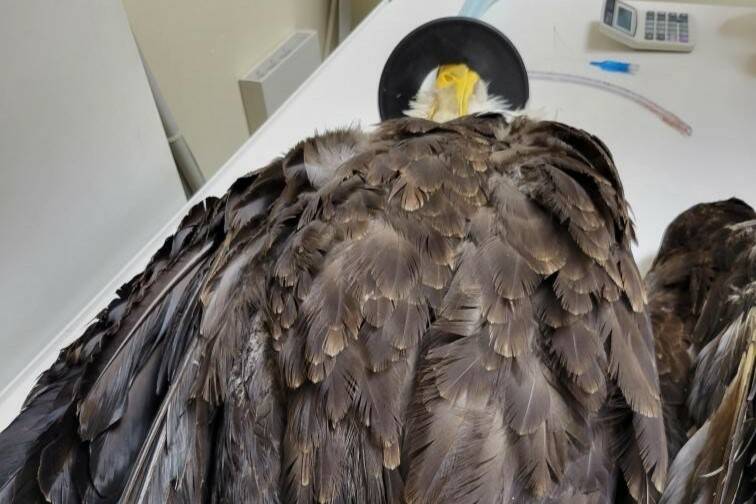Editor’s note: This is an ongoing story, and will be updated when more information is made available.
If at all possible, a grounded bald eagle will use its powerful legs to escape danger.
So when David Ward, a local licensed raptor rehabilitator with the bird rescue nonprofit Featherhaven, saw one trying to drag itself along the ground with its wings, he knew this wasn’t a typical case of an injured bird.
Ward received a report from the Washington Department of Fish and Wildlife of the eagle, located in west Enumclaw, on the afternoon of March 3. WDFW knows Featherhaven well, given its the only bird rehabilitation center around for at least 50 miles (the next two closest are in Olympia and Bainbridge Island) and has cared for hundreds of raptors since opening in 2014.
Within the hour, he and the bird arrived at Pine Tree Veterinary Hospital in Maple Valley to assess its condition.
Prognosis: not good.
“We found… a wound in the right ventral shoulder, fresh,” Ward said. “We did a series of X-rays, which showed [a] bullet in the caudal abdomen on the right side.”
The bullet was deformed, which can be caused when it comes into contact with soft tissue, Ward continued — but more than likely, it hit the spine, causing the eagle to be paralyzed from the proverbial waist down.
It was determined by Ward and two other experts that the chances of the eagle recovering was extremely low — “way less than 5%,” he said, given that nobody present was specialized in bald eagle spinal surgery — so it was humanely euthanized that evening.
The eagle has since been given to the federal government, as any attempt to disturb a bald eagle in any way, from taking feathers to shooting at — let alone kill — is a misdemeanor for a first offense, punishable by up to $100,000 in fines and/or a year in prison.
Any other offenses would result in a felony charge, which could result in up to a $250,000 fine.
According to Ward, the U.S. Fish and Wildlife Service will conduct its own forensic investigation and could open up an investigation into the eagle’s death.
That’s why Ward wanted the public to know about the incident, in the hopes that someone who may have any sort of knowledge of the incident will come forward to help law enforcement.
“I’m ticked,” he said, calling the shooting “illogical”. “… I don’t care if it’s on top of your cow. You can’t do that.”
It’s unclear how often bald eagles, which are no longer and threatened or endangered species, are shot each year, and how often such incidents are investigated and lead to charges or convictions Recent examples include a Dover, Ohio man was sentenced to a year probation and $5,500 in fines last October, while Wisconsin and West Virginia law enforcement launched their own investigations into bald eagle shootings around the turn of the new year.
Bald eagles are known to be opportunistic eaters — as in, they tend to use the least amount of energy in order to consume the six pounds of food it eats per day. Their diet often consists of carrion and fish, but they also hunt small mammals, which can include pets, and other birds. They have been occasionally known to kill deer, calves, or sheep, if necessary.
Enumclaw has a history with bald eagles in the area. In 2009, eight eagles became sick and died after eating a euthanized horse that was not buried. Additionally, several firework shows were canceled between 2010 and 2017 due to nesting balding eagles or their hatchlings, and official fireworks shows have not returned due to the eagles since 2017.
HOW TO PROTECT LOCAL RAPTORS
Beyond not shooting at bald eagles and other raptors, there are several other ways people can protect their local birds, Ward said.
Lead poisoning is a big issue. Since bald eagles will hunt injured water fowl or leftover guts from a hunted deer, they may end up ingesting lead ammunition.
“As populations grow, the suitable habitat for eagles near rivers is becoming more rare, so they’re moving inland, and their diet is changing from being a majority of fish to a diet of scavenging and eating carcasses,” Alex Wehrung, a spokesman for the Wildlife Center of Virginia told the Washington Post in 2022 about the eagles they were having to take care of. “As a result, we’re seeing more cases of positive lead toxicity in their blood. A lead fragment even the size of a grain of rice is enough to kill an otherwise healthy bald eagle.”
Other poisons for rats and other small mammals can be an issue too, Ward said.
Ward himself has rescued several raptors from netting, like what you’d find lining a soccer goal post of what people use to keep their chickens or ducks penned in with.
He recommends hard wire for small animal pens, so any raptors that attempt to grab an easy snack don’t get tangled.
Finally, Ward said to not throw out food when you’re driving, since the food attracts rodents and small mammals to the roadside, which in turn attracts their predators and puts them in harm’s way of passing vehicles.
He recalled pulling a raptor from the grill of a car after it continued driving for another six miles.


